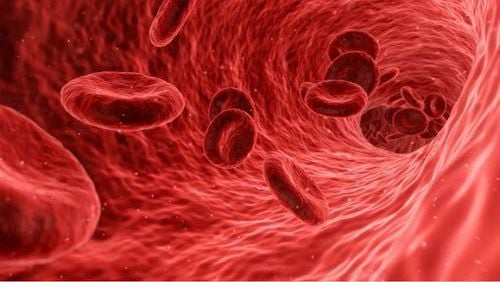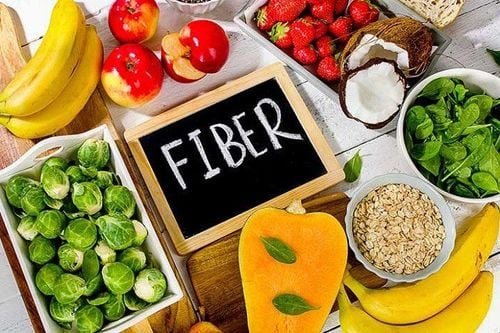This is an automatically translated article.
The article was professionally consulted with Master, Doctor Truong Thanh Tam - Pediatrician - Department of Pediatrics - Neonatology - Vinmec Danang International General Hospital.1. What is fiber?
Fiber is a type of carbohydrate that the body cannot digest. Instead of being broken down into sugar molecules like most carbohydrates, fiber moves through the body undigested. It contributes to the regulation of the body's consumption of sugar, helping to control hunger as well as blood sugar.Fiber has two types, both are good for health:
The first type is called soluble fiber, because of its ability to dissolve in water, it can lower glucose levels as well as lower blood cholesterol levels. . Foods with soluble fiber include oatmeal, dried seeds, beans, peas, apples, and blueberries. The other is called insoluble fiber, because it cannot dissolve in water, it can help move food through the digestive system, promote regular digestion and prevent constipation. Foods that contain insoluble fiber include wheat, whole-wheat bread, whole-grain couscous, brown rice, legumes, carrots, cucumbers, and tomatoes.

2. Benefits of Fiber Supplements
An estimated 3% of children in Western countries have chronic constipation, or bowel movements less than three times a week for at least two weeks.When constipated, stools moving in the intestines are often large, hard, and painful, which can worry children and parents. Children who are constipated also often have a related problem, inability to control bowel movements, causing them to pass stools or other health problems
And for some children, it doesn't go away. Thirty percent of children with chronic constipation before age 5 will continue to struggle with constipation after puberty, the researcher says.
There are many reasons to encourage fiber supplementation and ensure that the child is getting enough nutrients. First of all, fiber has the effect of increasing satiety and may help prevent diabetes.
Obviously, the most obvious benefit of fiber has to do with digestion. When combined with good hydration, fiber will keep your baby's digestive tract functioning properly and efficiently. This prevents and can sometimes help treat constipation.
Some other benefits that fiber brings in children such as supporting bowel movements. High fiber intake will help increase stool size and make it softer. Fiber makes the passage of stool easier, thus avoiding constipation for the body. In case the baby has loose stools, fiber will solidify the stool by absorbing water. It also helps to increase stool volume.
In addition, fiber helps to protect the health of the intestinal system of children. When children eat foods high in fiber, they will reduce the risk of hemorrhoids and the appearance of diverticula in the colon. Some fiber is fermented in the colon, which plays an important role in preventing disease in the large intestine. Fiber helps lower cholesterol levels, lowering lipoprotein levels to a low level means reducing "bad" cholesterol, so it will help lower total cholesterol levels in the blood.

Finally, another very important benefit is maintaining the ideal weight for the child. Vegetables and fruits are rich in fiber and have fewer calories for the same amount of food. Fiber also helps prevent colorectal cancer. A reasonable weight helps children avoid many different diseases such as obesity, diabetes...
3. How much fiber should you give your child?
According to the National Institute of Diabetes, Digestive and Kidney Diseases, children between the ages of 1 and 18 should get between 14 and 31 grams of fiber per day. Experts recommend eating 25 - 30 g of fiber/day or eating 12 g of fiber for 1000 calories eaten.Children can eat the amount of fiber depending on their age, which can be calculated simply by the formula: age + 5 = number of grams of fiber to eat. For example, an 8-year-old needs 8 + 5 = 13 g of fiber/day.
Most nutritionists say that the ratio of insoluble fiber to soluble fiber should be 25% to 75% or 3 parts insoluble fiber to one part soluble fiber.
Since most foods high in fiber have both types, it is not necessary to be too careful to separate the two. Should use fiber in nature such as oats, vegetables, ... than processed fiber.

4. Foods rich in fiber
Fiber is found in foods like whole grains, vegetables, and fruits. You can choose foods rich in fiber and suitable for children's taste easily. Here are 10 foods rich in fiber and good for your baby's health.Oatmeal : You can give your child oatmeal in the morning, this is considered a nutritious and delicious breakfast food. This tasty treat includes about 4 grams of fiber in each cup of oats (cooked). You can make it a kids favorite by adding other ingredients like cinnamon, maple syrup, and raisins. Apples: Every child loves the delicious taste of apples. With 3.6 grams of fiber in a small apple, an apple a day will be very good for the digestive system of children. You can add peanut butter for an extra 1.6 grams of fiber. Popcorn: Three cups of buttered popcorn contain 2 grams of fiber. Carrots: Sure, carrots are a food many kids won't like. But you can turn them into delicious treats, bake some small carrots with cinnamon, and you have a delicious treat with 2.9 grams of fiber in every 1/2 cup. Bananas: With 3.1 grams of fiber in one banana, this is a great afternoon snack. Whole-grain breads: Whole-wheat and whole-grain breads have an average of 2 grams of fiber per slice, but you can easily find varieties with 3 grams or more. Berries: Raspberries provide a generous 4 grams of fiber per 1/2 cup. Blueberries and strawberries have less, 1.8 grams and 1.5 grams, respectively, for the same amount. Whole-grain pasta: Whole-grain pasta has 2 grams of fiber per 1/2 cup. Pears: One medium pear (with skin) provides 5.5 grams of fiber! Sweet Potatoes: With 3.8 grams of fiber in one sweet potato.

5. What are the risks of adding too much fiber?
For parents who are worried that supplementing with fiber for their children is not enough. Therefore, it is possible that these parents use dietary fiber supplements for their children. This can backfire and lead to colic and diarrhea if the child has too much fiber in the digestive system. Some side effects when using too much fiber in children such as:Causes digestive problems: Eating too much fiber can lead to digestive problems such as bloating and diarrhea. A sudden increase in fiber, inadequate fluid intake, and inactivity, along with a high-fiber diet can increase these symptoms. Inability to absorb minerals: When children consume more than 50g of fiber per day, children can also face the risk of not being able to absorb minerals. This means that the child's body will excrete the minerals in the fiber instead of absorbing them. Some minerals may not be absorbed when there is a large excess of dietary fiber such as calcium, magnesium and phosphorus. A study in the Journal of Pediatrics found that a moderate increase in dietary fiber would benefit most children. Therefore, you should not take dietary fiber supplements (unless you are advised to take them by your doctor). Instead, plan your child's daily menu with all the delicious foods that are already high in fiber to offer. In addition to fiber, parents should supplement their children with supporting products containing lysine, essential micro-minerals and vitamins such as zinc, chromium, selenium, and B vitamins to help fully meet their nutritional needs. in children. At the same time, these essential vitamins also support digestion, enhance nutrient absorption, help improve anorexia, and help children eat well.
Parents can learn more:
Signs of zinc deficiency in children
Micronutrient deficiency and failure to gain weight in children
A key area of Vinmec Health system, Pediatrics Department - General Hospital Vinmec International always brings satisfaction to customers and is highly appreciated by industry experts thanks to the following advantages:
Gathering a team of leading pediatricians: including leading experts, with Highly qualified (professor, associate professor, doctorate, master), experienced, worked at major hospitals such as Bach Mai, 108.. The doctors are all well-trained and specialized. career, mind - reach, understanding young psychology. In addition to domestic pediatric specialists, the Department of Pediatrics also has the participation of foreign experts (Japan, Singapore, Australia, USA) who are always pioneers in applying the latest and most effective treatment regimens. . Comprehensive services: In the field of Pediatrics, Vinmec provides a series of continuous medical examination and treatment services from Newborn to Pediatric and Vaccine,... according to international standards to help parents take care of their baby's health from birth to childhood. from birth to adulthood Specialized techniques: Vinmec has successfully deployed many specialized techniques to make the treatment of difficult diseases in Pediatrics more effective: neurosurgery - skull surgery, stem cell transplantation. blood in cancer treatment. Professional care: In addition to understanding children's psychology, Vinmec also pays special attention to the children's play space, helping them to have fun and get used to the hospital's environment, cooperate in treatment, improve the efficiency of medical treatment.
Please dial HOTLINE for more information or register for an appointment HERE. Download MyVinmec app to make appointments faster and to manage your bookings easily.
Reference source: webmd.com; healthline.com













